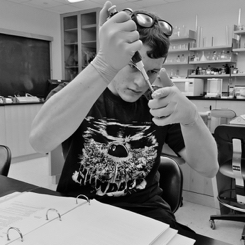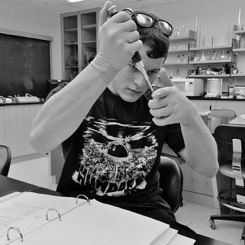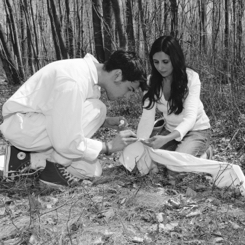Dr. Neeta Connally
Professor 
Science Building 140
connallyn@wcsu.edu
203-837-8749
Profile: https://sites.wcsu.edu/connallyn
Connally Lab Website: https://www.wcsuticklab.com/
BIOGRAPHY
Neeta Connally is a medical entomologist who oversees the Tickborne Disease Prevention Laboratory at WCSU. She holds a B.S. in Animal Biology from Louisiana Tech, a M.S.P.H. in Human Parasitology from Tulane University, and a Ph.D. from the University of Rhode Island. Before joining the WCSU Biology Dept. in 2011, she was an Associate Research Scientist at the Connecticut Emerging Infections Program at Yale School of Public Health where she oversaw epidemiologic studies pertaining to Lyme disease risk and the prevention of tickborne diseases in the northeastern U.S.
RESEARCH INTERESTS
Research in the Connally Tick Lab at WCSU focuses upon the prevention of Lyme and other infectious diseases transmitted by blacklegged ticks in the northeastern United States. In particular, we are interested in how diseases can be prevented peridomestically by manipulating the landscape, interfering with the tick life cycle, or by changing patterns of human behavior. Students are vital to helping the laboratory function. Since 2011, more than 40 undergraduate students have contributed to Tick Lab projects. Studies in the Tick Lab have been funded by multiple agencies, including the Centers for Disease Control and Prevention (CDC) and the U.S. Environmental Protection Agency (EPA). We collaborate on tickborne ecology and prevention projects with several academic, scientific, and community partners, including the Town of Ridgefield (CT) Health Department, Nuvance Health, Yale Emerging Infections Program, CT Department of Public Health, CDC Division of Vector-Borne Disease, the TickEncounter Resource Center at the Univ. of Rhode Island, and several regional land trusts and environmental advocacy groups.
SURF PRIMARY SETTING
Laboratory and/or field work.
SKILLS TO BE ACQUIRED DURING FELLOWSHIP
- Field sampling techniques
- Arthropod identification
- Dissection microscope techniques
- Data entry
- Statistical data analysis
- Use of GPS devices
- Use of ArcGIS software
- Creation of health promotion/education materials
- Collaboration with community/university/CDC research partners
- Developing web or social media content
SKILLS REQUIRED TO BE ELIGIBLE FOR A FELLOWSHIP IN THIS LAB
- Excellent written and oral communication skills
- Good organizational skills
- Attention to detail
- Willingness to work outdoors in hot summer conditions
- Willingness to handle live arthropods (including ticks)
FELLOWSHIP DATES
Contact faculty member for availability.
| Former SURF Fellows | ||||
|
|
|
|
 |
|





